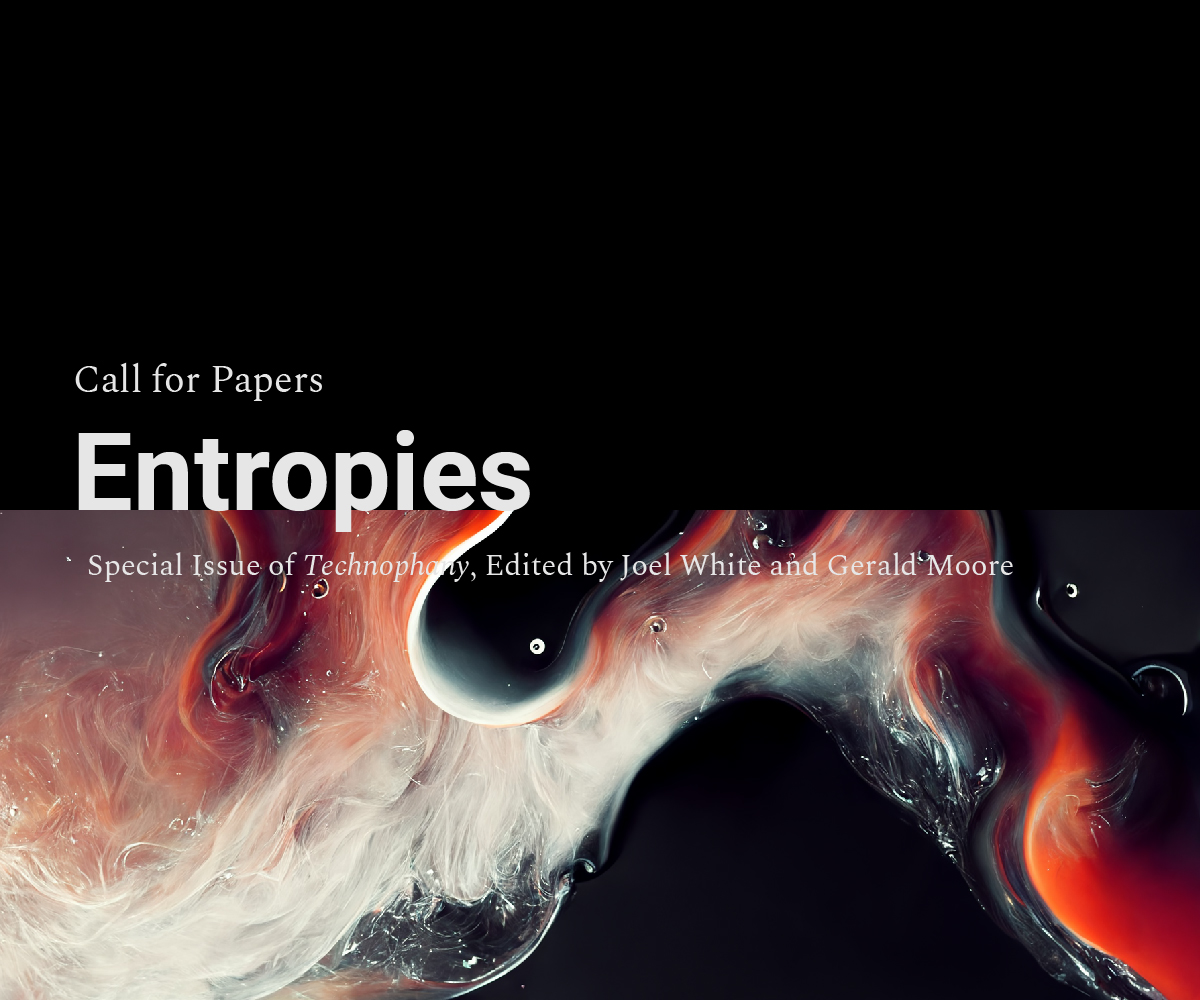Call for Papers: ENTROPIES
 Entropies
Entropies
Editors: Joel White and Gerald Moore
Scope and Invitation for Contributions:
Many of the world’s current politico-ecological crises derive from a generalised anthropogenic acceleration in the rate of terrestrial entropization, what Bernard Stiegler calls the Entropocene. Global warming originates from an increase in the entropic combustion of fossil fuels (Rifkin, Stiegler, New Daggett); the global decrease in biodiversity correlates to an increase in entropic statistical disorder at the level of species interactions (Montévil); and information overloading (Wellmon), caused by the proliferation of information technologies, has increased the amount of informational entropy, resulting in the rise of misinformation, disinformation, uncertainty and conspiracy theories (Floridi). In light of these crises, critical reflection regarding entropy’s theoretical and practical significance has become necessary. Technophany invites contributions to this special issue on all conceptions of entropy be they classical thermodynamic, statistical mechanical, informational, biological, economic, noetic or otherwise with the aim of opening reflection as wide as possible regarding this problematic concept (in the Kantian sense). If we are to respond successfully to the Entropocene, which could only ever mean slowing down the production of entropy and never negating it, then this reflection must also be free from axiological prejudice, taking into account entropy’s often-paradoxical but necessary status as the dissipative condition of possibility of many of the systems that life depends on.
Coined by Rudolf Clausius in 1865, classical thermodynamic entropy not only quantifies how much internal energy has been transformed into work through the equalization of system temperatures (Joules per Kelvin), but it also describes an as-yet unviolated physical law. As Thomson and Helmholtz stated, the irreversible nature of thermodynamic entropy entails unavoidable cosmological consequences where energetic systems, including living, cognitive, technical and social systems, will finally come to an eternal stand still (“heat death”). Early philosophical reflections by thinkers such as Nietzsche, Engels and Bergson often dealt with these more metaphysical questions. And these demand again our attention. For if we are to truly understand the Entropocene, then we must seek to grasp the reality of entropy’s inevitable meanings no matter how unpalatable. Indeed, while, epistemologically, Boltzmann’s statistical mechanics changed thermodynamic entropy’s juridical status—thermodynamic entropy could now be explained by the probable microscopic distribution of particle velocities—Boltzmann was under no illusion that the universal increase in entropy could, in practice, be violated, nor that it should be. It was Boltzmann, after all, that first proposed entropy as a principle of biological adaptation stating that the struggle for existence was itself a struggle for entropy (a notion furthered by Lotka and Odum). And the same could be said of informational entropy, as developed by Claude Shannon in 1948. Even though informational entropy does not explicitly measure energy dissipation but the certainty of one event following another given what is known about the information content of a particular source, it also measures complexity and noise. And similar to thermodynamic entropy, noise and complexity instead of being purely destructive often function as the condition of evolutionary change.
As well as proposing the notion of the Entropocene, Stiegler offers the hypothesis that the conceptual consequences of entropy have yet to be integrated into philosophy. Akin to Isabelle Stengers and Ilya Prigogine’s arguments from Order out of Chaos, this amounts to arguing that philosophy remains stuck in an 18th century Newtonian framework where entropy is absent. The consequence is that philosophy remains conceptually ill-equipped to deal with the pressing issues of the Entropocene. The articles collected will, therefore, be of a broad nature, reflective of entropy’s conceptual plurality and import. The aim is also not to determine what entropy is—whether quantitively or qualitatively—but to consider how this equivocal concept—that is at once the condition of possibility and impossibility of the systems we depend on—problematises our relation to fundamental phenomena such as life and death on earth, climate change, technology, time, chance, information and noise, thought itself and the cosmos at large.
Submissions:
We invite contributions in the form of academic articles from across disciplines. The average required length of a contribution is 6,000 words, accompanied by a abstract. Interested contributors please send 300–500-word abstracts and a short 100-word biography to the editors (entropiestechnophany@gmail.com) before October 30th 2022. As for the house style of formatting, please follow the Technophany submission guidelines, where a word template for articles can be found: http://journal.philosophyandtechnology.network/submission-guidelines/
Timeline:
Abstracts due – 30th October, 2022
First draft chapters due – 15th March, 2023
Publication – Fall 2023



